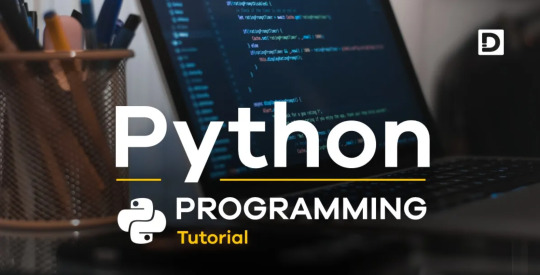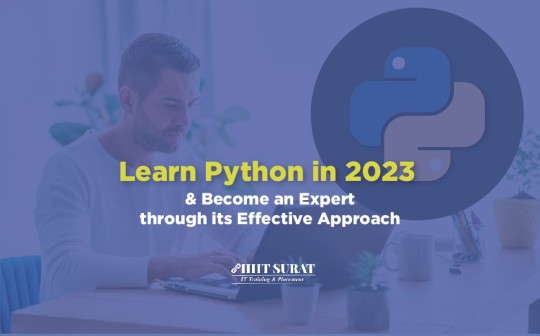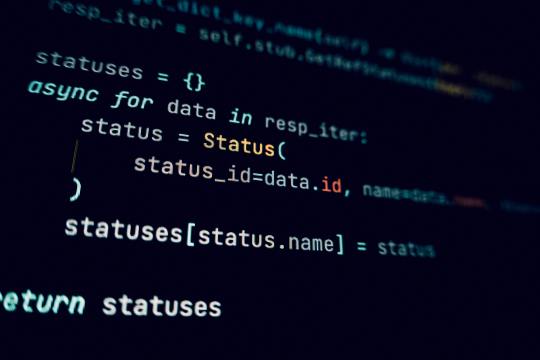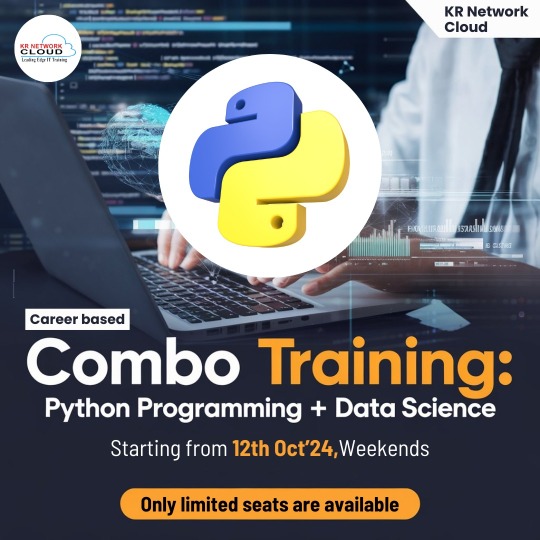#Python course for beginners
Explore tagged Tumblr posts
Text
Introduction to Data Science with Python

Data Science with Python has emerged as one of the hottest skills in the technological sector in today's world. From customer trends and market prediction, data science has transformed how companies see things concerning their decisions. If you've had your eye on entering this exciting field, you're looking at just the right language to begin with—Python.
There is much value in learning Python, as it is very beginner-friendly, versatile, and possesses a rich ecosystem of libraries, e.g.
Pandas, NumPy, Matplotlib, and Scikit-learn-all which are core libraries for performing data analysis, visualization, and machine learning tasks.
TCCI Computer Coaching Institute in Ahmedabad is imparting a practical, beginner orientation course in Data Science with Python. Whether you belong to BCA, MCA, B.Sc IT, or just someone purely curious about data, our programming will make it easy for you to grasp its basics.
🔍 What You Will Learn:
Basics of Python including data types
Data cleaning/manipulation with Pandas
Visualization data with Matplotlib and Seaborn
Introductory machine learning with Scikit-learn
Mini-real-world projects and case studies
Our expert instructors guide you step by step with real-time examples and personalized coaching, No programming experience is required, and therefore nobody needs to worry because our training is for beginners.
Big data on one side, AI and analytics on the other, this is your gateway to a successful tech career: Data Science with Python.
Location: Bopal & Iskon-Ambli Ahmedabad, Gujarat
Call now on +91 9825618292
Get information from: https://tccicomputercoaching.wordpress.com/
#TCCI - Tririd Computer Coaching Institute#TCCI – Data Science Training in Bopal Ahmedabad#Data Science with Python#Python course for beginners#Data analytics training#Python for data science#Learn data science
0 notes
Text

Essential Python Course for Beginners Guide
Enroll in a Python course for beginners to master coding fundamentals. This beginner-friendly course covers Python syntax, data structures, and real-world applications, helping you start a rewarding tech career.
0 notes
Text
Master Python in 2023: Unleash the Power of Its Effective Approach

Python is a versatile and powerful programming language that has gained immense popularity among developers and tech enthusiasts. Its simplicity, readability, and vast array of libraries and frameworks make it an ideal choice for various applications, ranging from web development to data analysis and artificial intelligence. If you've been considering learning Python or want to enhance your coding skills, enrolling in a Python course can be a game-changer for your career.
We’ll explore the benefits of taking a Python course and how it can pave the way for your coding succes
Building a Solid Foundation:
A Python course provides beginners with a solid foundation in programming. You'll start from scratch, learning the basics of Python syntax, data types, control flow, and functions. By mastering these fundamental concepts, you'll develop a strong programming mindset that can be applied to other languages as well. Read More : Learn Python in 2023 & Become an Expert through its Effective Approach
#learn python#python course#python course for beginners#python programming course#python learning course#python coding for beginners
0 notes
Text
Why Learning Python is the Perfect First Step in Coding
Learning Python is an ideal way to dive into programming. Its simplicity and versatility make it the perfect language for beginners, whether you're looking to develop basic skills or eventually dive into fields like data analysis, web development, or machine learning.
Start by focusing on the fundamentals: learn about variables, data types, conditionals, and loops. These core concepts are the building blocks of programming, and Python’s clear syntax makes them easier to grasp. Interactive platforms like Codecademy, Khan Academy, and freeCodeCamp offer structured, step-by-step lessons that are perfect for beginners, so start there.
Once you’ve got a handle on the basics, apply what you’ve learned by building small projects. For example, try coding a simple calculator, a basic guessing game, or even a text-based story generator. These small projects will help you understand how programming concepts work together, giving you confidence and helping you identify areas where you might need a bit more practice.
When you're ready to move beyond the basics, Python offers many powerful libraries that open up new possibilities. Dive into pandas for data analysis, matplotlib for data visualization, or even Django if you want to explore web development. Each library offers a set of tools that helps you do more complex tasks, and learning them will expand your coding skillset significantly.
Keep practicing, and don't hesitate to look at code written by others to see how they approach problems. Coding is a journey, and with every line you write, you’re gaining valuable skills that will pay off in future projects.
FREE Python and R Programming Course on Data Science, Machine Learning, Data Analysis, and Data Visualization

#learntocode#python for beginners#codingjourney#programmingbasics#web development#datascience#machinelearning#pythonprojects#codingcommunity#python#free course
10 notes
·
View notes
Text
Started a course I found for learning programming earlier and did you guys know. It's all math
#i was so caught up in the delight of learning computer program i forgot for a moment that computers were all math#dhdDNDJA#I'm gonna try though. the MIT open source whatever it is has a beginner's programming course using python 3 so 🤷♂️ why not
3 notes
·
View notes
Text

🚀 Ready to become a Full Stack Python Pro? 🐍💻 Unlock your tech potential with up to 50% OFF on our Full Stack Python Training at eMexo Technologies! 🎯 Dive into real-world projects, hands-on coding, and expert guidance. 🔥
🎓 Why wait? This is your chance!
CLICK THE LINK https://www.emexotechnologies.com/ to grab this amazing offer before it’s gone! 🏃♂️💨
💡 What You'll Gain:
✔️ Full Stack Development Skills
✔️ Python Mastery
✔️ Industry-Ready Expertise
🔥 Hurry, limited spots available! Don’t wait – get ahead in your career NOW!
For Get More Information:
📞 Phone: +91 9513216462
💻 YouTube: https://youtu.be/Rt9pTK8MMUw?si=a38J9LzSAJx6maoh
#python#python developers#pythonprogramming#python training#python for beginners#coding#emexotechnologies#bangalore#electroniccity#traininginstitute#education#learning#course#training#tech education#tech skills#career growth
2 notes
·
View notes
Text
Unlock the Power of Python Programming: A Complete Guide
Python programming has become one of the most sought-after skills in the world of technology. Its simplicity, flexibility, and vast ecosystem of libraries make it a top choice for both beginners and experienced developers. In this guide, we will explore various aspects of Python programming, from basic concepts to advanced applications like machine learning and web development.
Python Programming: A Beginner-Friendly Language
Python programming is renowned for its readability and straightforward syntax, making it ideal for beginners. Whether you are just starting to code or transitioning from another language, Python offers a smooth learning curve. Key Python programming concepts include variables, data types, and control structures, which are essential for writing functional code.
youtube
Python Data Structures: Organizing Data Efficiently
One of the core strengths of Python programming is its rich set of data structures. Lists, dictionaries, tuples, and sets help you store and manage data effectively. Understanding Python data structures allows you to create more efficient programs by organizing and manipulating data effortlessly.
Functions in Python Programming: Building Reusable Code
Functions are a fundamental part of Python programming. They allow you to break down complex problems into smaller, reusable chunks of code. Python functions not only promote code reusability but also make your programs more organized and easier to maintain.
Loops in Python Programming: Automating Repeated Tasks
Loops are an essential feature in Python programming, allowing you to perform repeated operations efficiently. With Python loops such as for and while, you can iterate over sequences or perform tasks until a specific condition is met. Mastering loops is a key part of becoming proficient in Python.
Object-Oriented Programming in Python: Structured Development
Python programming supports object-oriented programming (OOP), a paradigm that helps you build structured and scalable software. OOP in Python allows you to work with classes and objects, making it easier to model real-world scenarios and design complex systems in a manageable way.
Python Automation Scripts: Simplify Everyday Tasks
Python programming can be used to automate repetitive tasks, saving you time and effort. Python automation scripts can help with file management, web scraping, and even interacting with APIs. With Python libraries like os and shutil, automation becomes a breeze.
Python Web Development: Creating Dynamic Websites
Python programming is also a popular choice for web development. Frameworks like Django and Flask make it easy to build robust, scalable web applications. Whether you're developing a personal blog or an enterprise-level platform, Python web development empowers you to create dynamic and responsive websites.
APIs and Python Programming: Connecting Services
Python programming allows seamless integration with external services through APIs. Using libraries like requests, you can easily interact with third-party services, retrieve data, or send requests. This makes Python an excellent choice for building applications that rely on external data or services.

Error Handling in Python Programming: Writing Resilient Code
Python programming ensures that your code can handle unexpected issues using error handling mechanisms. With try-except blocks, you can manage errors gracefully and prevent your programs from crashing. Error handling is a critical aspect of writing robust and reliable Python code.
Python for Machine Learning: Leading the AI Revolution
Python programming plays a pivotal role in machine learning, thanks to powerful libraries like scikit-learn, TensorFlow, and PyTorch. With Python, you can build predictive models, analyze data, and develop intelligent systems. Machine learning with Python opens doors to exciting opportunities in artificial intelligence and data-driven decision-making.
Python Data Science: Turning Data Into Insights
Python programming is widely used in data science for tasks such as data analysis, visualization, and statistical modeling. Libraries like pandas, NumPy, and Matplotlib provide Python programmers with powerful tools to manipulate data and extract meaningful insights. Python data science skills are highly in demand across industries.
Python Libraries Overview: Tools for Every Task
One of the greatest advantages of Python programming is its extensive library support. Whether you're working on web development, automation, data science, or machine learning, Python has a library for almost every need. Exploring Python libraries like BeautifulSoup, NumPy, and Flask can significantly boost your productivity.
Python GUI Development: Building User Interfaces
Python programming isn't just limited to back-end or web development. With tools like Tkinter and PyQt, Python programmers can develop graphical user interfaces (GUIs) for desktop applications. Python GUI development allows you to create user-friendly software with visual elements like buttons, text fields, and images.
Conclusion: Python Programming for Every Developer
Python programming is a versatile and powerful language that can be applied in various domains, from web development and automation to machine learning and data science. Its simplicity, combined with its extensive libraries, makes it a must-learn language for developers at all levels. Whether you're new to programming or looking to advance your skills, Python offers endless possibilities.
At KR Network Cloud, we provide expert-led training to help you master Python programming and unlock your potential. Start your Python programming journey today and take the first step toward a successful career in tech!
#krnetworkcloud#python#language#programming#linux#exams#coding#software engineering#coding for beginners#careers#course#training#learning#education#technology#computing#tech news#business#security#futurism#Youtube
2 notes
·
View notes
Text
How to start your career as a coder - guidance of programming for beginners
As we know , the new generation is becoming so advanced with technology. With technology we can do a number of things in less time and effort. Now, learning to code is also a significant part of technology. We can say that coding is an important part of technology. It is a basic and demanding skill for any company which wants to be part of this digital world.
Here are some significant topics that are discussed to become a good coder -.
1.Find out why you want to learn to code-
Before you start studying, think about why you want to learn to code. Think clearly with full focus what thing you want to learn in coding and why. It is too much. After entering there are many parts available which you can explore.
2.Make a great choice in choosing which coding language for you want to go -
In coding, there are too many programming languages which you can learn but learning each language is a difficult task. As a beginner, you can go with HTML or CSS programming languages which do not contain data structure and algorithms.
3.Selecting Best coding bootcamps -
Coding bootcamps are educational programs which are made for development of practical skills. While the institute will different for each bootcamps, you can typically expect to learn:
Programming fundamentals like javascript, CSS and HTML.
Languages which are popular like java, python or C.
Web development.
HTML codes for website development.
4.How to choose a coding bootcamp-
There are various important things which you can remember while choosing a good coding bootcamp -
Learning format - Both online and offline mode for learning is available. You should choose which environment is suitable for you. In online mode you can take classes according to your needs. And in offline mode you get a chance to interact face to face.
Cost - As we discussed earlier, coding bootcamps can be expensive. You should think about how much you have to spend and how much you want to spend on bootcamps.
5.Benefits of joining a coding bootcamp-
Boost your salary potential -
In technical professions, demand is increasing with time in comparison to other professions. For software developers, new opportunities are increasing day by day. Now,any tech professional can join any field and department according to their interest.
Expand your career possibilities -
The best advantage to join a coding bootcamp is you can increase your skill level. You can learn any new thing with the help of that. The following list details some of the more common jobs you may be able to get after your finish a bootcamp:
1. Back - end developer
2. Full - stack developer
3. Junior developer
4. Software engineer
5. Application developer
6. And so on
#coding course#coding for kids#coding classes#programmer#python#coding for beginners#software engineering#coding is fun
3 notes
·
View notes
Text
Kickstart Your Tech Career: Why Internships Are More Important Than Ever
In the rapidly changing digital economy we live in today, a degree no longer suffices. What truly makes you stand out is practical experience—and that's where internships fit in.
If you are a computer science or IT bachelor's or master's degree holder, applying for a Java internship for freshers can prove to be one of the best decisions you ever took. Java remains a basis of enterprise software, and hence it is extremely important to study Java for those who are interested in working on backend development, application security, or web systems with scalability. Internships provide freshers with hands-on experience in writing optimized code, debugging, version control, and project collaboration.
On the opposite end, the world of technology is also eager for developers who excel at everything. This is why an full stack web development internship is a first preference for future professionals. With these internships, you get exposed to frontend and backend technologies—HTML, CSS, JavaScript, React, Node.js, Express, MongoDB, etc.—and you become a jack-of-all-trades of the world.
But above all, it is not that these internships simply teach you how to code, but how they teach you how to work, manage teams, deadlines, and deployable applications that solve real problems.
From product companies to tech startups or freelance work, the hands-on experience you learn through a concerted internship can define your career path. Theory is fine to learn, but experience is what gets you ready for a job.
#embedded systems course in Kerala#full stack java developer training in Kerala#python full stack developer course in Kerala#data analysis course for beginners#data analytics courses in kerala#full stack java developer course with placement#software developer internship in Kerala#java internship for freshers#full stack web development internship#software training institutes in kochi#best software training institute in kerala#best software training institute in trivandrum#software training institutes in kannur#best software training institute in calicut#data science course in kerala#data science and ai certification course#certification in ai and ml
1 note
·
View note
Text
Python Programming Course with Certification – Live Online
Join Sunbeam’s Live Online Python Programming Course and kickstart your journey in coding, automation, data analysis, and AI. Guided by expert Mr. Nilesh Ghule, this course offers a structured curriculum, hands-on practice, and live Q&A. 📅 Start Date: 2nd June 2025 🕒 Timing: 7:00 PM – 9:00 PM (Mon to Fri) 💰 Fees: ₹8100 (Inclusive GST) 🎓 Certification + Project + Group Discount 🔗 Register now at www.sunbeaminfo.in 📞 Contact: 82 82 82 9806
✅ Bonus Group Offer:
👨👩👧👦 Team of Five, Time to Thrive! Get 20% OFF on learning when enrolling in a group of five!
✅ What You'll Learn:
Python basics to advanced topics
Data analysis using NumPy & Pandas
Visualization with Matplotlib
Web & functional programming
Image processing using OpenCV
Real-time projects and problem-solving
✅ Who Should Join:
College students, freshers, and job seekers
Working professionals aiming to upskill
Anyone with basic programming knowledge
#“Python online course”#“Learn Python in Pune”#“Python training with certification”#“Live Python classes”#“Python classes for beginners”#“Best Python course in India”#“Python for data analysis”#“Instructor-led Python training”#“Affordable Python course”#“Python programming course Pune”#“Python course with projects”#“Data science Python course”
0 notes
Text
Learn Future-Ready Skills to Lead Tomorrow’s Tech World
Get future-ready with skills that employers demand! From coding to digital strategy, My Growth Crafter’s programs prepare students for emerging tech roles with a focus on innovation, adaptability, and creativity.

#python course for students#python coding bootcamp#automate with python#python data science basics#beginner-friendly python training
0 notes
Text
Getting Started with Python
Discover the world of programming with our beginner-friendly Python course in Delhi. Whether you're entirely new to coding or just starting your journey, our 'Python Learn for Beginners' program is designed to make learning Python easy and fun. In this course, we'll cover the fundamentals of Python programming, helping you build a strong foundation. Join us to explore the power of Python and embark on your programming adventure.
#Python course in delhi#Python for beginners#best way to learn python#python course for beginners#python basics for beginners
0 notes
Text
Is Python Hard to Learn Without a Tech Background?
In today’s digital world, Python is everywhere, from powering AI models to automating repetitive tasks at work. But if you don’t have a technical background, you may wonder. Python is one of the most beginner-friendly programming languages available, and it’s an excellent choice even for non-tech learners. Let’s explore why.
Introduction: Why Python Appeals to Non-Tech Learners
Whether you’re in marketing, finance, teaching, or customer service, you’ve probably seen Python mentioned in job descriptions or professional development programs. There’s a good reason for that.
Python is known for:
Simple and readable syntax
Strong community support
Wide range of real-world uses
Growing demand in the job market

According to the TIOBE Index, Python is consistently ranked among the top three programming languages globally. More importantly, it’s being used far beyond traditional software development roles.
Let’s break down how Python can be learned without a technical background, and why now is the perfect time to get started.
Why Python Is Ideal for Beginners
1. Clean and Easy-to-Read Syntax
Python uses plain English-like commands, making it easy to understand even for those with no coding experience.
Example:
python
print("Hello, world!")
You don’t need to memorize complex symbols or statements. A line like the one above prints a message to the screen simple and intuitive.
2. No Need for Prior Coding Knowledge
Python doesn’t require knowledge of hardware, networking, or complex algorithms to get started. You can begin with basic concepts such as:
Variables
Loops
Conditions
Functions
These are explained clearly in most Python training online courses and are easy to practice in beginner-friendly environments.
3. Beginner Resources and Courses Are Abundant
There are many structured learning paths, especially Python certificate programs, designed for beginners with no prior experience. These programs teach:
Step-by-step Python programming
Real-world projects
Hands-on coding challenges
Career-focused applications
If you're looking for the best Python course for beginners, make sure it includes project-based learning and real-world examples.
Real-World Applications That Don’t Require a Tech Background
Python isn’t just for developers. Professionals in business, design, education, and analysis are using it every day.
1. Data Analysis and Reporting
Python is widely used for automating reports and analyzing data.
Example:
python
import pandas as pd
data = pd.read_csv('sales.csv')
print(data.describe())
A non-programmer in sales can quickly summarize key sales metrics using this simple script.
2. Automating Tasks
Repetitive tasks like renaming files, organizing spreadsheets, or emailing reports can be automated using Python.
3. Content and Marketing
Marketers use Python to scrape websites for competitive research or analyze campaign performance.
4. Teaching and Education
Teachers use Python Program Ideas to create mini-games, quizzes, or even basic simulations for students.
Common Challenges and How to Overcome Them
While Python is beginner-friendly, non-tech learners can still face a few hurdles. Here’s how to tackle them:
1. Fear of “Code”
Many beginners are intimidated by the idea of “coding.” The truth? Coding is just writing instructions for the computer in a structured way. Python makes this easier with its human-readable syntax.
2. Technical Jargon
Terms like “variables,” “loops,” and “functions” might seem foreign. But once explained in plain language, they’re easy to grasp. Good instructors and online class Python modules focus on relatable explanations and simple exercises.
3. Lack of Hands-On Practice
Learning by reading isn’t enough. You need to build, break, and fix things. Choose the best online course on Python that includes hands-on projects and coding environments.
Step-by-Step Python Learning Plan for Non-Tech Beginners
Here’s a practical learning plan tailored for non-technical learners:
Step 1: Understand Why You’re Learning Python
Define your goals: automating tasks, data analysis, new career
Choose a focus area: web, data, automation, AI
Step 2: Enroll in a Beginner Course
Look for:
Structured Python certification courses
Simple, task-based lessons
Code-along videos
Real-world mini-projects
Step 3: Practice Regularly
Use an online certification in Python course with built-in editors or notebooks to practice daily.
Step 4: Build Projects
Try Python Program Ideas such as:
A basic calculator
A to-do list manager
Expense tracker
Weather app
Step 5: Get Certified
Certification proves your skills and boosts your resume. Look for reputable python online certification programs that include exams and projects.
Python Learning Tools and Environments for Beginners
Even without installing anything, you can code in Python using beginner-friendly platforms. However, for deeper skills, it’s better to install Python locally and use environments like:
IDLE (Python’s default editor)
Jupyter Notebook (great for data and notes)
VS Code (for larger projects)
These tools are free and often used in best python classes online.
Career Benefits of Learning Python as a Non-Technical Professional
1. Cross-Functional Job Roles
Python enables professionals to move into hybrid roles like:
Data-driven marketing analyst
AI-assisted customer support manager
Automation consultant
Business analyst with coding skills
2. Higher Salaries
According to Glassdoor and Indeed, Python-skilled professionals earn 20%–40% more on average even in non-tech roles.
3. Job Security and Relevance
As industries evolve with AI, automation, and data science, those who know how to work with Python are more likely to stay relevant.
What to Look for in a Python Course If You Don’t Have a Tech Background
Here’s what defines the best place to learn Python for non-tech users:
Feature
Description
Beginner-Friendly Curriculum
Uses simple language and real-life examples
Project-Based Learning
Helps apply skills in realistic scenarios
Supportive Instructors
Guides who explain complex topics simply
Flexible Schedules
Allows learning alongside your current job
Python Certificate Programs
Offers certification upon course completion
Key Takeaways
Python is one of the easiest programming languages to learn, even without a tech background.
Real-world Python applications are vast, including marketing, education, data analysis, and automation.
A step-by-step, hands-on learning path with supportive guidance is key to success.
Certifications and structured courses boost your learning outcomes and career potential.
The best Python course for beginners is one that includes practical projects, simple explanations, and career alignment.
Conclusion
Python isn’t hard to learn, even if you come from a non-technical background. With the right guidance, hands-on projects, and consistent practice, anyone can master Python and open new career opportunities.
Ready to start? Enroll in H2K Infosys’ Python course today for real-world projects, expert mentorship, and career-focused certification. Master Python the easy way no tech background required.
#learn python#Python training online#python online certification#Python certification course#python certificate programs#online class python#online certification in python#best python classes online#Python Program Ideas#best online course on python#best place to learn python#best Python course for beginners
0 notes
Video
youtube
#youtube#Deep learning with pytorch - full course#Deep learning pytorch course#Pytorch full course for beginners#Learn python programming for beginners
0 notes
Text
The Sensor Savvy - AI for Real-World Identification Course
Enroll in The Sensor Savvy - AI for Real-World Identification Course and master the use of AI to detect, analyze, and identify real-world objects using smart sensors and machine learning.

#Sensor Savvy#AI for Real-World Identification Course#python development course#advanced excel course online#AI ML Course for Beginners with ChatGPT mastery#AI Image Detective Course#Chatbot Crafters Course#ML Predictive Power Course
0 notes
Text
Join Python programming course at TCCI and learn coding from scratch with expert guidance and hands-on practice.
#Python programming course#learn Python in Ahmedabad#Python training classes#beginner Python course#TCCI computer coaching
0 notes